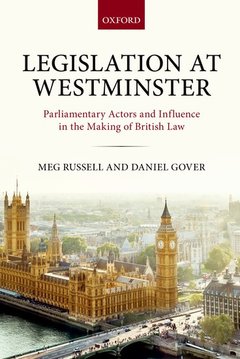Description
Legislation at Westminster
Parliamentary Actors and Influence in the Making of British Law
Authors: Russell Meg, Gover Daniel
Language: English
Subject for Legislation at Westminster:
Legislation at Westminster
Publication date: 01-2019
336 p. · 16.1x23.1 cm · Paperback
Publication date: 01-2019
336 p. · 16.1x23.1 cm · Paperback
Legislation at Westminster
Publication date: 08-2017
338 p. · 16.7x24.1 cm · Hardback
Publication date: 08-2017
338 p. · 16.7x24.1 cm · Hardback
Description
/li>Biography
/li>
The Westminster parliament is a highly visible political institution, and one of its core functions is approving new laws. Yet Britain's legislative process is often seen as executive-dominated, and parliament as relatively weak. As this book shows, such impressions can be misleading. Drawing on the largest study of its kind for more than forty years, Meg Russell and Daniel Gover cast new light on the political dynamics that shape the legislative process. They provide a fascinating account of the passage of twelve government bills - collectively attracting more than 4000 proposed amendments - through both the House of Commons and House of Lords. These include highly contested changes such as Labour's identity cards scheme and the coalition's welfare reforms, alongside other relatively uncontroversial measures. As well as studying the parliamentary record and amendments, the study draws from more than 100 interviews with legislative insiders. Following introductory chapters about the Westminster legislative process, the book focuses on the contribution of distinct parliamentary 'actors', including the government, opposition, backbenchers, select committees, and pressure groups. It considers their behaviour in the legislative process, what they seek to achieve, and crucially how they influence policy decisions. The final chapter reflects on Westminster's influence overall, showing this to be far greater than commonly assumed. Parliamentary influence is asserted in various different ways - ranging from visible amendments to more subtle means of changing government's behaviour. The book's findings make an important contribution to understanding both British politics and the dynamics of legislative bodies more broadly. Its readability and relevance will appeal to both specialists and general readers with interests in politics and law, in the UK and beyond.
Meg Russell is Professor of British and Comparative Politics in the Department of Political Science, University College London, where she is Director of the well-known research centre the Constitution Unit. She is widely recognized for her expertise on the UK parliament, and on legislatures more broadly, and has previously published substantial research on the House of Lords, House of Lords reform, select committees, MPs' representative roles, and the governance of the House of Commons. She is author or editor of five books, most recently The Contemporary House of Lords: Westminster Bicameralism Revived (OUP, 2013). She appears regularly in the media, is frequently cited by both academics and practitioners, and has formally acted as an adviser to the Royal Commission on Lords reform, the Leader of the House of Commons and several select committees. Daniel Gover is a researcher based in the School of Politics and International Relations at Queen Mary University of London. Prior to this he worked as a research assistant at the Constitution Unit at University College London, and as a researcher in the House of Commons. He has published research on various topics related to the UK parliament, including the legislative process and 'English Votes for English Laws', and based on his findings has given evidence to several parliamentary select committees.
© 2024 LAVOISIER S.A.S.




